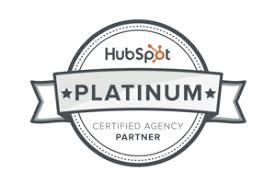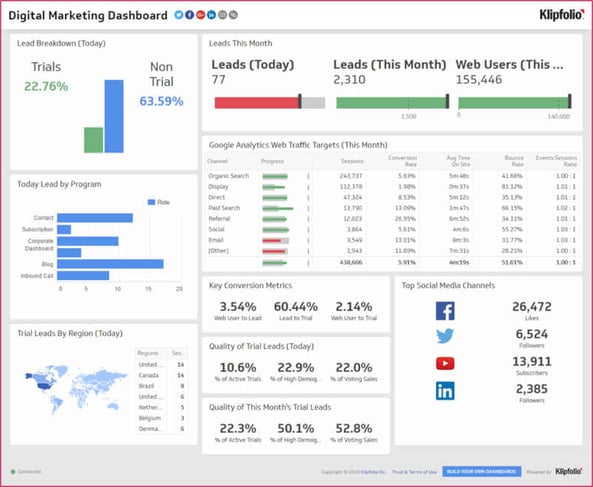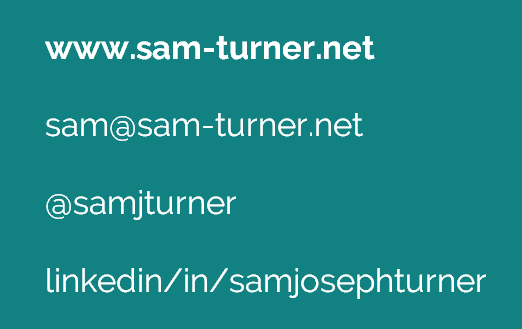The Secret Life Of An Inbound Marketing Agency
- Home
- The Secret Life Of An Inbound Marketing Agency
Thank you very much. Last time at London HUG you had Brian Halligan. This time you've got a Northerner who speaks too fast and he's only just big enough to see over the top of this lectern so I apologise in advance. People at the back of the room, I do exist. Good morning. When Clwyd asked me to come and speak at this event I started to think about the thing that I could speak about that would give the most value to everybody here. I've been to HUG before, but I've never spoken at one.
Normally there's a mixture of people in the room. There's a technology side, there's people from HubSpot, there's agency side and there's new clients or people who are interested in HubSpot. I thought the thing that will eventually unite us all in some way; shape or form is the relationship between clients and agencies. I genuinely believe that. How many agencies or technology side people are here? There's the quick hands of audience participation is the most hated phrase in the English language, but that's the only one it will be. Okay. So relax, this is not an anti-agency pitch by any means. I genuinely believe that the agency client relationship is one of the most important relationships that, you could have. It is a relationship that can really impact your bottom line as a marketer.

If you're in marketing or a Salesperson it can make your career fly if you get a good one. So leveraging that agency client relationship properly and making it work in an ideal manner, is a big advantage for businesses and yet we've probably all been in supplier side relationships that haven't quite gone as planned. We've all taken on technology and kicked out at some points, so what goes wrong? And how can we make it go more right? That's the title, but really the topic is Agency Client Relationships and generals. Think of it as if you watch Channel 4's a Secret Life of the Zoo, but for agencies. Using the Secret Life of the Zoo means I can put animals in a presentation which is never a bad thing because we've already seen from Adam's presentation.
If you don't watch the Secret Life of the Zoo by the way, there's no need by the time you finish the presentation. It's all here. A bit of background of why I think I'm qualified to speak on this. I recently left the agency as Head of digital. I'd been there six and a half years and very recently, in fact, at the end of August I left the agency. When I started, the agency we're a local regional agency who were doing things like outsourcing SEO to another agency because they didn't have in house expertise.
 Over the last six and a half years we've changed how the agency works to the point where it's now a HubSpot Platinum agency. It's set up as a much more successful and significant business ready to kick on and grow further. My remit over that time has changed from things like building the SEO function, to being the salesperson and to making sure that our clients were happy. As Head of Digital, the job role is basically doing anything that the agency needs in a lot of ways. Across the agency client piece I've seen it all. Nowadays, I straddle both sides, while I was at the agency by the way; my partner was a client of the agency. So, not only did I see it from the client side, I then got home and got told what it was really like to be a client of the agency. So, I saw it from outside too
Over the last six and a half years we've changed how the agency works to the point where it's now a HubSpot Platinum agency. It's set up as a much more successful and significant business ready to kick on and grow further. My remit over that time has changed from things like building the SEO function, to being the salesperson and to making sure that our clients were happy. As Head of Digital, the job role is basically doing anything that the agency needs in a lot of ways. Across the agency client piece I've seen it all. Nowadays, I straddle both sides, while I was at the agency by the way; my partner was a client of the agency. So, not only did I see it from the client side, I then got home and got told what it was really like to be a client of the agency. So, I saw it from outside too
“If you've had a bad agency client experience, let's use this to look at some ways to make sure that never happens again”
Nowadays, I do copywriting and consulting for agencies, for their clients and direct to businesses which means typically I spend my time on that sort of thing as a freelancer. If you've had a bad agency client experience, let's use this to look at some ways to make sure that never happens again. If you've got a good client agency relationship, then great. Let's do some things to make sure that we can leverage that further and improve it even more. Before we go into looking at how we can improve things, how we can make things better, I just want to spend a couple of minutes exploring what can go wrong in an agency client relationship. If you've had one that hasn't gone 100% right, these might not be the problems that you experienced but these two things are common scenarios where nobody's done anything particularly wrong.
The client agency relationship for whatever reason just hasn't quite worked out. These are two ways that can happen.
- When an agency starts to engage with clients, the agency will have an ideal fit.
- They'll have a target market that they want to work with and if you work with HubSpot you may well have a buyer persona that you have as a client side business.
There's nothing wrong with that. There's nothing nefarious. Defining the clients that you want to work with is good practice whether you are an agency or a business. At the start of the relationship, the agency will want to know everything about you and:
- Will want to try to make sure that you're a good fit
- They can deliver for you
- They're going to make sure that they hit your sales goals
The problem comes when we're all in business and we're all in it to make money, whether we're an agency or a business outside of an agency. The problem comes when somebody who is a close friend of the agency approaches the agency and says ”Oh, I'd really like to do business with you” or somebody with a large budget approaches the agency and says, “I'd really like to do business with you” then all of a sudden that's very tempting for the agency to engage with that client even if they're not an ideal fit. Again, it comes back to the whole idea on buyer persona; they're a guide to who we work really well with or who you work really well with. But it's ok to depart from that, as long as you're sure you can deliver.

Sometimes from the agency side of things it can be tempting to depart from it and maybe it's not as easy to deliver what the client wants if the fit isn't there with the agency. Equally, the client side, I'm sure you would all love when hiring an agency to see eight agencies at an eight week tender process. Unless you're in the Government or Healthcare, that's probably not really realistic when your day to day life is trying to:
- Make your marketing sing
- Get everything done
- Get the PR release out
- Publish five blogs
You end up going with the agency that you know, or an agency that somebody has recommended or the agency with the best reviews and maybe if we had those eight weeks and eight agencies tender process, you could have found somebody that fitted better.
That's just two examples of how you end up in this scenario where you want apples and the agencies offering oranges. There's nothing wrong with either business, it's just not a particularly good fit. I've been very careful to avoid using this word so far but what we're talking about here is rather than being bad, it’s the idea of suitability. I genuinely believe there are very few bad agencies out there because bad agencies just do not exist for very long. If you are a bad agency there is too much noise around how bad you are for you to stay in business for a long time. If you do stay in business, you just stay in business to exist. You don't really go out, push and grow more and more during your time as an agency.
“Suitable vs Unsuitable”
The topic that we're really talking about I think better termed, suitable versus unsuitable or finding the best fit agency for you as a client. As an agency, finding clients that you can deliver for time and time again productively is also going to have great results for you as an agency. Having said that, just to obstinate things even more, if you are an agency and the client terms you as unsuitable, clients will not refer to you as unsuitable. They will refer to you as bad. In their conversation, with connections where people that they talk to, you will be termed a bad agency that did not produce results. There's something in this for the agencies in the room or the technology providers. There's something in this that you focus on:
“The suitability that the fit of the clients you go out and acquire.”
So that's how these things can happen, again with no fault on either side. That's how these things can sometimes happen with relations between clients and agencies. So back to the important stuff, a Secret Life of the Zoo. The way I'm going to do this from this point forward, is just to explore three things that I think would improve agency client relationships that could happen. Join the pre-sales bits or and join the early engagements between agencies and clients. Again, these come mainly from my time as Head of Digital and seeing how we improved clients' interactions over time. Things that
- we did right,
- things that we did wrong,
- things that helped us basically during my time doing that
Problem Number One
No-one talks about who's going to move the snake. This refers to an episode of the Secret Life at the Zoo where some wise person who probably had nothing to do with the animals and was based in an office far away, decided that what they were going to do was take the 12 foot long re-articulated python and take it out of its perfectly good cage and give it a health check. This is an animal that is described on the zoos website as man eating and the most dangerous animal in the zoo. Great idea, by somebody at this point during the episode of the Secret Life of the Zoo. I'm starting to think this is only going one way. We're about to watch a very dark and grim episode of the Secret Life of the Zoo, which is completely unexpected.

We're heading towards this sort of territory and just to help signpost what's going on in the scenario, I've annotated a picture for you, just to give you a bit more information on that, on the various roles that are at play in this. So after the shock of the fact that this snake is out of its cage and is being held down by some individuals who are questioning why they chose that particular path in life, the logical part of my mind starts to ask questions like when they were interviewed did anyone:
- Tell these people that this is what they would be doing?
- Are they qualified?
- Did you go to school to learn how to wrestle an articulated pipe?
That's 12 foot long and is described as man eating.
Are they aware that if they get this wrong, they’re some serious consequences? I'm actually not sure which end the head is anymore. When I did this, I thought it was at end, but now I'm not so sure. When they started do this were they aware of the consequences if they let go of this Python? If you haven't spotted this massive metaphor coming while we're actually talking about here is not re-articulated python and what we're talking about here is your marketing and the people that you're handing is over to when you hire an agency. With probably most things in business, I genuinely think that one of the things that go wrong between client and agency relationships is a people thing. It's not enough of the right people involved or it's the right people not spending enough time on the projects.
It's a gap between getting an agency really into you as a client or vice versa, whichever side you want to put it on. If you've ever listened to a pitch by an agency or you've been in an agency pitch, you might have heard some of these. I certainly have said some of these in pitches to clients, these are common agency ways of talking and they're all perfectly good ways of representing agencies.
They're all perfectly accurate but our Senior Designer has an insert award here, doesn't matter if that Senior Designer's job is to manage the design team. If that Senior Designer is not going to be doing the design work, then that statement is meaningless and you can go down and tick them all off as if that person isn't involved or if that part isn't any good, then those statements can ultimately be meaningless unless you've got the right people involved.

I would argue that what you want to get to is either agency or clients in a situation where you know everybody who is going to be on your team and you wouldn't hire people into your business without so much as knowing their names. I certainly wouldn't hand over the keys to something as important as your marketing.
The agency should have done some of the vetting on the team that is going to work, that that's their job. They should be hiring good people but it doesn't mean that as a client on the client side, you can ignore it completely. You know your business better than the agency no matter how much time they spend learning about your business.
So get to know who it is that's going to work on your marketing. Try to figure out whether they're a good fit for you and try to figure out whether you would hire them ultimately. When I had a think about this, the easiest way is to sum this up is you're sold on the agency by what the agency is offering. You buy the ethos, you buy the approach, you will buy the past performance but you are really buying the people that are going to work on your projects. You are hiring again manpower, expertise and knowledge of the individual people. So make sure that you're comfortable with that.
“No one talks about who is going to move the snake”
So problem number one, no one talks about who's going to move the snake. Some practical things to do to help this is a discussion on how to work on your project. We've talked about their experience and our activities.
Talk with the agency around why the agency thinks they're suitable. That's a good way of getting the agency to say, “Okay, we really think this account manager is going to work well because they've worked with a pharmacy, a pharma business before”. A couple of points and their availability, if you go out and you hire people because they are available, you will get bad hires.
I can tell you that from experience of having done that. If the agency is putting people in place because they have availability within the agency, again, that's a way of maybe not getting the best fit available.
It should be somebody who is a particularly well-qualified or particular has the expertise to deliver for what it is that you're after as a client. A different way of using availability, talk about what access you'll have to those key people so that's the Senior Designer.
Are you actually going to be able to talk to them on a regular basis? Talk with the agency about how that will work. Will it all be through an account manager? Is that what you want or would you like more direct access?
Obviously accepting that you're not going to have a direct line to the head of design on a regular basis, agencies in the room, your people are your business. You've hired these great people where's the negative in this? Get them in front of clients more often. Get them involved with the people that you worked with; show them the great expertise that you've hired in.
Problem Number Two
Counting small insects is difficult. This refers to a thing that happens. So every year at Chester Zoo and this is covered on the Secret Life of the Zoo, there's a fantastic piece of PR where Chester Zoo published that editing a stock check of animals. There's 11,000 animals at the zoo and every year it gets picked up by the BBC and the Guardian and national newspapers and it gets splashed around everywhere that Chester Zoo are doing their stock take with pictures of zookeepers with clipboards trying to count various animals.
So you can imagine if you've got two tigers, it's quite easy and if there is only one tiger then somebody should've noticed that a long time ago. If you are counting the butterfly house or the bug house, it's a more difficult and there is a point where the counting seems to get a little bit loose at the point where you're trying to sort of add up all of the butterflies and the monsters that were around in the insect house. This is a similar situation.
I would say to agency reports and the reports that are put in front of clients. So if you are an agency or you work at an agency currently or use HubSpot dashboards, you might have something like this. Maybe it's in Klipfolio or it's in Databox or it's in Google data studio or whatever it is that you use internally or with your agency.

You've probably got a report that looks something like this and can be investigated. We did a lot of work and the agencies that I worked with aren't on these reports and we produced what we thought was, but we produced one that we thought gave clients everything that they wanted to see at a glance.
That's something that they could load up in the morning and they could check their key figures and be happy with their marketing. Having now reflected on that and done the work and talked to clients, I would say that dashboards like this that aren't actually used on a day to day basis, as in your going in to try and investigate to find the answer to a question, they're borderline meaningless and they don't fulfil the purpose for which people think they have been created for.
I've got some data to support that as well. The flip side of this by the way, these are really useful if you've got a question. If you're going after a specific question and you want the answer to how much traffic comes from Facebook or something even more complex than that, these are great. But if you just want something that summarises performance,
I would argue that these aren't that great and the reason why I would say that, as we went out to clients after having done the work to develop these very sophisticated dashboards ready and we asked clients a load of questions but the only one we needed to ask was how often do you look at your dashboard? 80% said never or almost never because they weren't providing anything of use, they weren't providing the answers that their clients actually wanted to see.
In this scenario, I think there's a better way of doing it. I think there's a better way than this complicated mix of figures that we think is important. Find one to four things that you really care about as a client.
Make sure your agency know what those one to four things are, dashboard them and discuss them every week. By dashboard them, it could be literally on an A-board, behind your office desk and update it every morning when you come in or it could use something more significant like Klipfolio, but just pick the one to four things that you really want to see improved.
Think about why you went after the agency in the first place. Think about its wonderful metrics that you really want to see .Put them on a dashboard and then just only discuss those.
I would argue that one of those four things needs to be sales, either revenue or volume. Now, if you are a marketer who at the moment is not judged on sales and revenue, I wouldn't necessarily go to your boss and say, “please give me another target. I'm really interested in being judged on sales and revenue”. At some point probably during your career you are going to be judged as a marketer on sales and revenue. The two are getting closer and closer.
HubSpot have brought them closer and closer. It's probably likely that at some point you'll be looked at in terms of the revenue that you generate as a marketer. It's no bad thing to start personally yourself looking at how you think your activities have an impact on the sales that your business is generating. If you don't talk about one of your one to four things each week, just get rid of it.
It's not that important. When you put it on there, I'm sure you thought it was, but if it's not coming up in regular conversations with an agency it's just one of those dashboards, it just doesn't matter to you that much. I know you thought it did, but the evidence is there if you're not discussing it with an agency and again, agencies, complete clarity on how you're going to be judged by your clients and that is a challenge in the agency environment and knowing exactly what it is the clients want from you. If you implement this sort of system, you're going to know exactly what clients want up to four metrics that you want the clients to see improve.
What's not to love about that? That's a perfect scenario for an agency in my mind.
Problem Number Three
Baby rhinos don't appear by magic. This isn't going to be a section about the birds and the bees. Rather, it's going to be a section about just Chester Zoo's brilliant conservation and brilliant centre. I would say I'm not far from Chester Zoo. I'm lucky enough to be able to go to Chester zoo quite often with my young lad. You can't go to Chester zoo with a gap of more than three months or so without there being another baby animal appears.
Their conservation program and structures are great. It's an inter-zoo thing. So it's all done with linked to Europe to try to protect endangered species and put some good back into the environment rather than the negatives that we've all heard about over the last few years.
“It's a process”
In particular the baby rhinos have been great over the last few years. At the moment I think there's two there, but they have a successfully bred several endangered rhinos and then they've gone out to all the zoo's throughout Europe and the plan is to take some back into the wild as well. So the conservation program is excellent. The reason why it's excellent and that bit talks about it in a bit more detail is it's structured. It's a process.
There's a plan. There's inter-zoo, dependability. There are trained experts who are on it and they all follow the structure of getting these endangered animals, populations and they follow it again and again and again. If you do good things more often, you end up with good results.
Yet in 2015, when there was a survey around businesses that use structures and processes, 63% of businesses that they only occasionally had documented processes and only 4% said that they always had documented processes.
“If you do good things more often, you end up with good results.”
I would say that is probably fairly representative of the agency world processes within the agency world are complicated and sometimes difficult. Yet structure and process is a huge part of agency life. If you are client side and you've not worked within agency or you've not seen the inner workings of an agency, a lot of it revolves around structure and process and the way I'd encourage you to think about it again. If you've not worked agency side:
- How difficult is it to stay on top of your own marketing or;
- Your own sales or;
- If you're an MD to stay on top of everything it is that you deal with within a business.
It's really difficult. Now imagine doing that 10 times over 50 times or over a hundred times over if you're a big agency.
It's impossible without structure and process. If you don't have that as an agency, then you are adding to this almost instead of taking it away from it from clients. Marketing is a chaotic discipline. By its very nature, there is a lot to do. They’re lots of ideas. It's creative. It's based on spark and ingenuity.
Agencies provide orders that are chaos. They should provide structure and give you a basis to succeed and to launch your marketing forwards. So problem three, baby rhinos don't appear by magic. Start to ask questions about agencies that you look at or about your current agency around how work's organised.
- Are they agile?
- Did they use something like Asana?
- How did they manage projects?
- Do they have somebody dedicated to it?
- How is the agency going to organise all the work that runs through the agency?
- How's it going to prioritise?
- How is your work going to make it to the top of the pile and be done on a certain timescale?
- What's your process for on boarding as a client as a good starting point?
So did the agency have a process but the agency might not know these off the top of their head? You know and that's fine but you might need to go away and think about it or bring back documents and that's absolutely fine.
I wouldn't expect any agencies to, but at least by asking the question you've both started to think around what that process could be. Describe your ideal scenario to the agency and tell them where you want to be and then ask for the sort of root map.
What we're going to do first, second, third, fourth, fifth. What's my rough plan? We don't need to necessarily stick to it. Gantt charts are dead, as we all know but what is the rough plan that we're going to follow over the next 12 months?
“Agencies, now's the time to do this if you haven't already”
Process and structure will really help your business to fly. Imagine if everything that you did was all documented and new people who came into the team could just follow it straight away. Maybe it already is but if you get new people in your team doing it again and again and again, new clients just follow and established structure and process.
Fantastic! You're going to fly and grow like anything and the agencies that grow really well have got this nailed.

So just a brief summary the three that we've looked at before I finish;
“No one talks about who is going to move the snake”
Get to know your agency team as if they are employees because that is essentially what they are, the people that work for the agency or the people who are going to be doing the work on your marketing. Don't leave it to chance that they are going to be suitable to do the work that you want them to do.
“Counting insects is difficult”
If every metric is important, then no metric is important. Just pick a very limited number of metrics that you want an agency to focus on and accept that they’re the ones that are going to work towards and that will make the relationship nice and clear for everybody.
“Baby Rhinos don't appear by magic”
Doing things more often needs process and structure. It's impossible without it. Anybody who does good things such as athletes, successful business people, etc. structures and process are the backbone to it and they're especially the backbone to agency life. If you want a bit more on that, while I was prepping this, I came across a great blog from Clwyd, on his Whitehat SEO website. If you just search for Whitehat SEO, how to hire a digital marketing agency, there's lots more on this, from Clwyd, with his research of what's involved and what needs to be done. Really great read would really recommend it. I'll be around until late today. I'm staying for the Clwyd's talk and I'll be around after that. So any more questions while I'm here, feel free. If not, those are my contact details. Thank you very much.

Questions from the Audience
Q: Do we have any questions for Sam?
Q1: Just one question that you mentioned that structure planning process and then you mentioned it sounded like to get rid of Gantt charts. So what's left?
A: If you follow a Gantts Chart, the process of the Gantt chart is a Gantt chart there is a fairly famous story about Gantt charts. But if you read the book on whatever the process that I just mentioned, I can't remember the name but if you've read the book on that, you will know the Gantt chart were first created in the first world war, so that's where Gantt charts came from. The plan was we're going to do this and that and then it will all follow forwards and it will all run smoothly. Nobody has ever followed a Gantt chart like that again, it's just don't work like that. Gantt charts only work if they're active and you have a plan at the start and then the Gantt chart moves around and you accept that things were a bit more fluid. I don't think not having that; the overall picture is a worse thing than having it and not moving.
Did that consultant again shot Vishal simplifies the process for the client, getting them on that journey over complicating that process sometimes leads to confusion and chaos and it's hot to sell the process. So my whole point was if you don't use it again you say that is that what have you here to take the potential client and then taking the hand rolling that you will.
Yeah, I agree completely. So I think the Gantt chart shows the overall structure of where you want to get to and where you want to get from. I would strongly recommend there is some acceptance from both sides that what's going to happen and week eight as far as the Gantt chart is concerned might not quite happen in week eight.
That's the plan but actually if we get to week eight and the thing in week 12 is now more important, we're going to move that forwards to week eight. That's the sort of agile approach. I still think the Gantt chart is useful because it shows you where the overall project is going. People who tried to follow it rigidly, the thing in week eight has to stay in week eight otherwise it doesn't move, I don't feel that works anymore and I think that's why I say no to Gantt charts.

I think if you follow an agile methodology, then that gives you the flexibility to address issues as they arrive. You have to be pragmatic and you have to look at a project as a series of changes that are not necessarily anticipated.
The analogy I would put it is something like you're raising money, you go to the bank, you put together a business plan or you go to VCs and you've put a lot of money into creating these complicated spreadsheets and everybody looks at them and you argue with them for the accountants and everybody else and it all gets signed off.
It gets put in a drawer and it never gets looked at again. It's a good guide, but it's any kind of plan, not sure if it was Churchill who said that, it falls apart when it meets reality or it meets the enemy or whatever it is, it's a starting point.
It has to be many clients as well from an agency's point of view, will refer back to an initial plan and say, well, we're not here yet. We're not. They’re reasons for that and you need to have an open relationship with the client and it needs to be a partnership where things are fluid and they change and everybody's got to understand that. That's when a really good agency partner, client relationship works well. It's when it becomes rigid and everybody refers back to contracts and you said this and we said that, then it all starts falling apart.

Q2: Charles, when you sign it, you said the staff in the agency should be treated in the front. When do you decide when that situation might change?
I guess just repeating the question.
At what point is that transition essentially dealing with employees who might morph from one, from either from being an employee to being so instead of pass for an agency, like go out and hire for that role with any business?
A: So that is a difficult one. Yeah. I think it's when you've got to the point where you can see that person generating and you don't want to look at every employee like this, I imagine, but it's when you can see that person making as much of an impact on your business if they're in the business full time rather than paying for them through an agency.
But a good agency too, will probably have that conversation with you. I mean we've had conversations, in my past agency with plenty of people around. Look if we'd done a really good job, you might not need us and you know, 12, 18 months plus time, you might be all set up and going with HubSpot, so that's great. We've done our job and you're successful. You like us, wonderful but at that point you might need to hire a Marketing Exec, or you might need to hire a HubSpot expert so sit within the business. So it's difficult to put an actual figure on it. But it's a good thing to be aware of. It's something that I think does happen regularly, especially with a Hubspot type project.
It's interesting and it's one of the things that we plan for with many clients from day one, we will do what we call skills transfer. So we'll take on a load because the client doesn't have the capability to scale and we will because we've got the team, we've got all of the people, we can do all the things they want to do, but over time, as the client grows, they might want to either take some of those roles internally or potentially even all of those roles internally or to build a team outside of their organisation, which they can manage and we can advise. I think a good agency is completely comfortable with that. T
hey shouldn't be constantly trying to keep it internally, keep it under their control. An agency's goal should be the success of the client.
“That's going to give you more referrals”
It's going to give you more business. You know, everybody wins. Sometimes agencies can be a little closed on that and say, no, no, we just want to be the sole source of all of this kind of stuff. It's an interesting conversation. This type of forum is actually quite a good place for that to happen. Thank you so much.
Resources
- Blog: Brian Halligan – London HUG
- Ebook: How to find and hire the perfect inbound marketer for your organisation
- Hubspot Information
- Guide: The Ultimate guide to SEO
- Ebook: How to attract more clients
- Blog: 21 signs your business is a poor fit
- Whitehat Inbound Agency
- How to document processes to scale your agency faster

